"Why do dogs eat grass?" is a question that perplexes many pet owners. This article delves into the myriad reasons behind this common yet intriguing canine behavior, exploring everything from nutritional needs to instinctual habits. Join us as we unravel this green mystery and shed light on a behavior that is much more than just a quirky canine trait.
Historical Perspectives on Dogs Eating Grass
Dogs, descendants of wild canines, have always exhibited fascinating behaviors, one of which is eating grass. Historically, observers have noted that domestic and wild canines alike often consume vegetation. This ancestral link suggests that today's domesticated dogs may inherit this trait from their predecessors.
Reasons Why Dogs Eat Grass
- Nutritional Needs: Contrary to popular belief, dogs are not strictly carnivorous. They are omnivores and occasionally require plant matter in their diet. Grass can provide essential nutrients like fiber, which aids in digestion. Some experts believe that dogs may turn to grass when their diet lacks certain elements.
- Digestive Aid: Grass acts as a natural fiber source and can help in bowel movement regularity. It's possible that when dogs feel gastrointestinal discomfort, they instinctively eat grass to induce relief.
- Behavioral and Psychological Factors: Dogs, like humans, may develop habits or behaviors driven by psychological factors. Eating grass could be a way to alleviate boredom or anxiety, or it could be a simple playful activity.
- Illness and Nausea: Sometimes, when sick, dogs might eat grass as a form of self-medication. This behavior is particularly noticeable in dogs that don't typically graze. They might resort to grass-eating to induce vomiting to relieve discomfort.
The Vomiting Myth
The belief that dogs eat grass solely to induce vomiting isn't entirely accurate. Research shows that only a small percentage of dogs vomit after eating grass, and not all dogs that eat grass appear unwell beforehand. This indicates that grass-eating is not always linked to a desire to throw up. However, when sick, some dogs might indeed eat grass to vomit and relieve feelings of nausea.
Health Implications of Grass Eating
While generally safe, eating grass can sometimes pose risks:
- Pesticides and Chemicals: Lawns treated with chemicals can be harmful to dogs.
- Parasites and Contaminants: Some grass areas might be contaminated with harmful parasites.
- Signs of a Bigger Health Issue: Consistent grass eating, especially if accompanied by symptoms like foam or bile in vomit, might indicate an underlying health issue.
Managing Grass Eating Behavior
- Monitor and Assess: Keep an eye on how often and how much grass your dog eats. If it is a regular occurrence and paired with vomiting, it is recommended that you see a vet to diagnose the underlying condition. If it is infrequent and there is no sign of illness, there is little to worry about.
- Safe Grass Access: Ensure the grass your dog has access to is free from harmful chemicals.
- Alternatives: Provide alternative sources of fiber and engage your dog in other activities to deter them from eating grass. There are many options to add fiber to your dog’s diet.
Understanding why dogs eat grass involves looking at their nutritional, psychological, and instinctual needs. While usually harmless, it's important to monitor this behavior for any signs of underlying health issues.
Frequently Asked Questions
Dogs may eat grass to induce vomiting when they feel nauseous. However, not all grass-eating leads to vomiting, and not all vomiting is due to illness.
Occasional grass eating is normal, but daily consumption should be monitored as it could indicate dietary deficiencies or boredom.
Grass itself is not harmful, but the risk lies in chemicals, parasites, or contaminants the grass might contain.
Ensure a balanced diet, provide alternative activities, and supervise outdoor time to limit grass eating.
If your dog frequently eats grass to vomit, especially if accompanied by signs of distress, consult a veterinarian.

Joseph Schifano is the President of The Academy of Pet Careers and Founder of DogNerdly.
With over 20 years of professional pet experience, Joseph got his start as an owner/operator of a 7-figure, all-inclusive pet care business. From there, he purchased The Academy of Pet Careers with a hopes of improving the quality of care provided by industry professionals. This role allowed Joseph to rub shoulders with some of the biggest names in the industry, and gain knowledge in every aspect of pet care.
After witnessing the popularity of social media influencers and the amount of misinformation being taught to pet parents, Joseph decided to create DogNerdly. The goal was to provide science-backed education for the average dog nerd in order to create a world where dogs and humans can live a more harmonious and empowered lifestyle.




